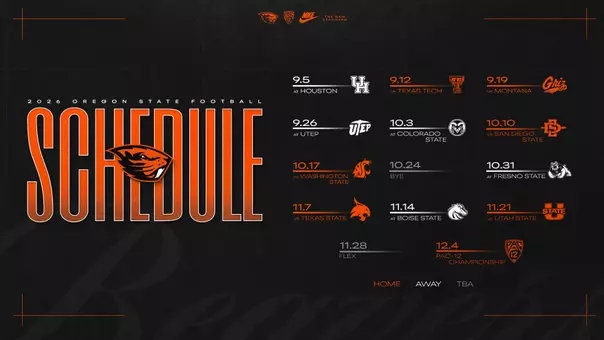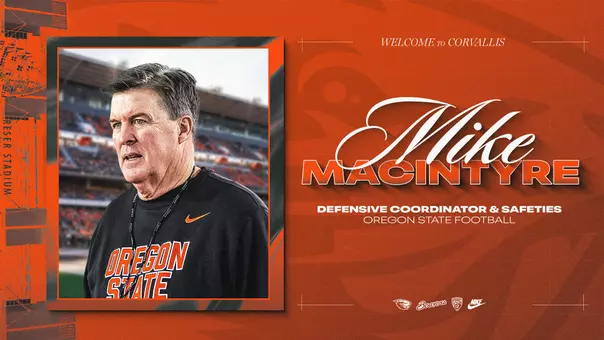
Remembering the Men of Roses -- Speculation Abounds
October 27, 2016 | Football
This is the fourth installment of a seven-part series written by Kip Carlson about the 1941 Oregon State football team that played in the 1942 Rose Bowl. The '42 Rose Bowl is the only one in the history of the storied game that was played outside of Southern California due to fears of an attack on the U.S. West Coast following Pearl Harbor.
This story first appeared in this year's football game-day program Saturday, Oct. 15 vs. Utah.
Oregon State University will honor the "Men of Roses" throughout the week leading up to the culmination of events this Saturday night when the Beavers host Washington State at Reser Stadium.
As November, 1941 drew to a close, German tanks were closing in on Moscow. The British aircraft carrier HMS Ark Royal and battleship HMS Barham had recently been sunk by German U-boats. The United States, already making arms available to Britain across the Atlantic Ocean, sent the Hull Note – a final request for Japan to remove its troops from French Indochina and China – across the Pacific; economic relations between the two countries had already been all but severed.
And in Corvallis, those matters were secondary to football.
"This conservatively happy little town of 8,000 people – including students – carried on its victory celebration today over the fact that Oregon State College will meet Duke in the Rose Bowl football game in Pasadena New Years Day," wrote Gail Fowler of the Associated Press in a December 1 story. "When the whooping and funmaking had subsided Saturday night, all the townspeople and students knew was that Oregon State had won the Pacific Coast Conference championship by beating Oregon at Eugene, 12 to 7, and had earned the bowl bid."
In that era, when a vote of conference schools selected the Rose Bowl representative, it was also up to the PCC school to select its opponent; the Beavers had picked unbeaten, untied Duke, the nation's second-ranked team. Top-ranked Minnesota was part of the Big Ten, which did not yet allow its schools to participate in bowl games.
"The game will match bowl-wise Wallace Wade, the Duke coach, who will be making his fifth trip to the Rose Bowl, against 38-year-old Lon Stiner, the youngest Coast Conference coach who, like his school, will be making his first appearance in the Pasadena saucer," Fowler wrote. "Stiner said he was tickled with the Duke selection because 'it's the only major team with an undefeated, untied record, and that ought to make a good talking point for me with my boys. They wanted Duke, too.'
"Husky, thin-haired Lon was nervous, excited, happy and worn out all at the same time. He didn't get a chance to relax until last night, when he and his wife and the families of his coaching staff got together and concocted this parody, which just about summarizes what the town feels:
'Jingle bells, jingle bells, jingle all the way –
'Oh what fun it'll be to ride – in the Bowl on New Year's Day.'"
The Beavers were expected to leave for Southern California on December 15, right after final exams had ended. In the meantime, the OSC players were being honored all across the state: a breakfast of businessmen in Corvallis drew 350 to pay homage and Gov. Charles Sprague was among the speakers; a newspaper story noted that so many organizations wanted to offer plaudits that some were having to be turned down and the coaching staff was dividing the rest between them rather than appearing as a group.
The big banquet would be December 3 at Portland's Multnomah Hotel, with a caravan of 40 cars carrying Beaver coaches, players and boosters being joined by more cars in Albany, Salem and other cities along the route. Sprague would be joined as a speaker by Portland Mayor Earl Riley, Oregon Secretary of State Earl Snell, acting OSC President Dr. F.A. Gillfilan and PCC President Prof. C.V Ruzek of OSC.
The crowd filled the hotel's grand ballroom and The Oregonian reported "Stiner, always a foe of 'bear stories,' could well have stayed 'on the bench' Wednesday night with an attack of laryngitis, but the successful young mentor croaked credit for the season's success to the players themselves and his aides – (assistant coaches Jim) Dixon and (Hal) Moe."
Stiner was selected as one of the members of the All-America football board, which had been formed 18 years prior by Knute Rockne, Glen "Pop" Warner, Tad Jones and Christy Walsh to select the nation's All-America team; the board was composed of "the outstanding grid mentors of the nation," The Oregonian reported.
Oregon State's status as Rose Bowl representative was hailed in other circles, as well. Seattle Times sports columnist George Varnell sat in on a gathering of three PCC head coaches – Washington's Jim Phelan, Southern California's Sam Barry and UCLA's Babe Horrell – and Varnell wrote: "Without argument of equivocation it was unanimously agreed O.S.C.'s victory in the conference race … was a most popular one."
Said Phelan: "I cannot figure how, from the point of sentiment, a more popular outfit could have been nominated for the bowl bid. I firmly believe there were more fans and coaches throughout the conference pulling for O.S.C. to win out than any other club in the race." Added Horrell: "Stiner had, this season, one of the best ball clubs in the country, a club that played good ball constantly. Some of the interested sidelines have started wondering just what Lon's gang will do in the Rose Bowl. They have no need to worry – O.S.C. will take care of itself against any kind of competition."
As the plaudits rolled in, some of the Beavers celebrated in a more down-to-earth way. The Associated Press sent out a wirephoto showing Oregon State tackle Bill Halverson, halfbacks Don Durdan and Bob Dethman, end George Zellick and fullback Jim Busch along with Dethman's wife Margaret standing in front of a car, wearing waders and holding fishing gear and a dog as they returned from an angling trip.
The photo appeared across the nation in newspapers delivered the morning of December 7 – just about the same time that planes launched from Japanese carriers attacked the United States naval and air bases at Pearl Harbor, Hawaii.
The fleet from which the torpedo planes, dive bombers and fighters were launched had sailed from Japan on November 26, while the Beavers had been practicing for their Rose Bowl-clinching win over Oregon. By the time the attack was over, more than 2,300 American servicemen were killed, over 180 aircraft had been destroyed and 18 U.S. ships had been sunk or severely damaged, including the battleships USS California, USS Nevada, USS Oklahoma, USS West Virginia and USS Arizona.
By the next day – when President Franklin Roosevelt called the attack "a day which will live in infamy" and the United States declared war on Japan – there was already speculation that Oregon State's first Rose Bowl might not be played. With much of the U.S. Pacific Fleet in ruins, the West Coast may not have been in danger of invasion but was thought to be susceptible to further air attacks from the Japanese fleet.
"Cancellation of the Rose Bowl engagement loomed as a distinct possibility, although no official word was forthcoming from either Pasadena, Calif., or Durham," wrote Nady Cates of the Winston-Salem, N.C., Twin City Sentinel on December 8. "Stunned by war news, officials on both sides of the country stood on watch and waited orders from Uncle Sam."
No word was immediately forthcoming. After a week off following the Civil War, the Beavers resumed workouts with their coaching staff hoping to work off some excess pounds the players had picked up during their layoff.
"The team was reported in good shape with no injuries to hamper any practice sessions," the Albany Democrat Herald reported December 11. "As soon as the team gets into its 'fightin' trim,' the gridders will settle down in earnest to conjure strategic plans to use against the Dukes." The Beavers were now scheduled to depart December 19 for Southern California.
Then, on December 13, Lieutenant General John DeWitt of the Fourth Army, whose command included the western states, requested that the Rose Bowl and the Tournament of Roses parade be called off "for reasons of National Defense and civilian protection," according to the Associated Press. California Governor Culbert Olson joined in the request, citing the highway congestion that would be caused, the police that would be needed at the events and the attractive target for attack a gathering of 100,000 football fans would make.
Rose Bowl officials began arranging to send refunds for 60,000 tickets that had already been ordered, priced from $3.30 for the cheap seats to $5.50 for boxes.
Stiner, informed of the decision that night, "said Oregon State officials were heartily in accord with the Army's request 'if there is a serious threat to the Coast,'" the Associated Press reported.
Within a day, word emerged that Duke had offered to host the Rose Bowl in its 50,000-seat stadium; offers had also been made to hold the game in Chicago or Kansas City. Even before the U.S. Army requested cancellation, Wade had telegraphed OSC Athletic Director Percy Locey with the offer.
By December 15, it was official: the game would go on, as an official Rose Bowl with the sanction of the Tournament of Roses committee.
"The football faithful of North Carolina jumped from the depths of gloom to something approaching hysteria today when word came through that the cancelled Rose Bowl game between Duke and Oregon State had been revived and would be played here," wrote Frank Gilbreth of the Associated Press.
The Beavers would still get their Rose Bowl; they just wouldn't be heading south, but east, when they left Corvallis to take on the Blue Devils.
NEXT: A Cross-Country Trip and Southern Hospitality.
This story first appeared in this year's football game-day program Saturday, Oct. 15 vs. Utah.
Oregon State University will honor the "Men of Roses" throughout the week leading up to the culmination of events this Saturday night when the Beavers host Washington State at Reser Stadium.
As November, 1941 drew to a close, German tanks were closing in on Moscow. The British aircraft carrier HMS Ark Royal and battleship HMS Barham had recently been sunk by German U-boats. The United States, already making arms available to Britain across the Atlantic Ocean, sent the Hull Note – a final request for Japan to remove its troops from French Indochina and China – across the Pacific; economic relations between the two countries had already been all but severed.
And in Corvallis, those matters were secondary to football.
"This conservatively happy little town of 8,000 people – including students – carried on its victory celebration today over the fact that Oregon State College will meet Duke in the Rose Bowl football game in Pasadena New Years Day," wrote Gail Fowler of the Associated Press in a December 1 story. "When the whooping and funmaking had subsided Saturday night, all the townspeople and students knew was that Oregon State had won the Pacific Coast Conference championship by beating Oregon at Eugene, 12 to 7, and had earned the bowl bid."
In that era, when a vote of conference schools selected the Rose Bowl representative, it was also up to the PCC school to select its opponent; the Beavers had picked unbeaten, untied Duke, the nation's second-ranked team. Top-ranked Minnesota was part of the Big Ten, which did not yet allow its schools to participate in bowl games.
"The game will match bowl-wise Wallace Wade, the Duke coach, who will be making his fifth trip to the Rose Bowl, against 38-year-old Lon Stiner, the youngest Coast Conference coach who, like his school, will be making his first appearance in the Pasadena saucer," Fowler wrote. "Stiner said he was tickled with the Duke selection because 'it's the only major team with an undefeated, untied record, and that ought to make a good talking point for me with my boys. They wanted Duke, too.'
"Husky, thin-haired Lon was nervous, excited, happy and worn out all at the same time. He didn't get a chance to relax until last night, when he and his wife and the families of his coaching staff got together and concocted this parody, which just about summarizes what the town feels:
'Jingle bells, jingle bells, jingle all the way –
'Oh what fun it'll be to ride – in the Bowl on New Year's Day.'"
The Beavers were expected to leave for Southern California on December 15, right after final exams had ended. In the meantime, the OSC players were being honored all across the state: a breakfast of businessmen in Corvallis drew 350 to pay homage and Gov. Charles Sprague was among the speakers; a newspaper story noted that so many organizations wanted to offer plaudits that some were having to be turned down and the coaching staff was dividing the rest between them rather than appearing as a group.
The big banquet would be December 3 at Portland's Multnomah Hotel, with a caravan of 40 cars carrying Beaver coaches, players and boosters being joined by more cars in Albany, Salem and other cities along the route. Sprague would be joined as a speaker by Portland Mayor Earl Riley, Oregon Secretary of State Earl Snell, acting OSC President Dr. F.A. Gillfilan and PCC President Prof. C.V Ruzek of OSC.
The crowd filled the hotel's grand ballroom and The Oregonian reported "Stiner, always a foe of 'bear stories,' could well have stayed 'on the bench' Wednesday night with an attack of laryngitis, but the successful young mentor croaked credit for the season's success to the players themselves and his aides – (assistant coaches Jim) Dixon and (Hal) Moe."
Stiner was selected as one of the members of the All-America football board, which had been formed 18 years prior by Knute Rockne, Glen "Pop" Warner, Tad Jones and Christy Walsh to select the nation's All-America team; the board was composed of "the outstanding grid mentors of the nation," The Oregonian reported.
Oregon State's status as Rose Bowl representative was hailed in other circles, as well. Seattle Times sports columnist George Varnell sat in on a gathering of three PCC head coaches – Washington's Jim Phelan, Southern California's Sam Barry and UCLA's Babe Horrell – and Varnell wrote: "Without argument of equivocation it was unanimously agreed O.S.C.'s victory in the conference race … was a most popular one."
Said Phelan: "I cannot figure how, from the point of sentiment, a more popular outfit could have been nominated for the bowl bid. I firmly believe there were more fans and coaches throughout the conference pulling for O.S.C. to win out than any other club in the race." Added Horrell: "Stiner had, this season, one of the best ball clubs in the country, a club that played good ball constantly. Some of the interested sidelines have started wondering just what Lon's gang will do in the Rose Bowl. They have no need to worry – O.S.C. will take care of itself against any kind of competition."
As the plaudits rolled in, some of the Beavers celebrated in a more down-to-earth way. The Associated Press sent out a wirephoto showing Oregon State tackle Bill Halverson, halfbacks Don Durdan and Bob Dethman, end George Zellick and fullback Jim Busch along with Dethman's wife Margaret standing in front of a car, wearing waders and holding fishing gear and a dog as they returned from an angling trip.
The photo appeared across the nation in newspapers delivered the morning of December 7 – just about the same time that planes launched from Japanese carriers attacked the United States naval and air bases at Pearl Harbor, Hawaii.
The fleet from which the torpedo planes, dive bombers and fighters were launched had sailed from Japan on November 26, while the Beavers had been practicing for their Rose Bowl-clinching win over Oregon. By the time the attack was over, more than 2,300 American servicemen were killed, over 180 aircraft had been destroyed and 18 U.S. ships had been sunk or severely damaged, including the battleships USS California, USS Nevada, USS Oklahoma, USS West Virginia and USS Arizona.
By the next day – when President Franklin Roosevelt called the attack "a day which will live in infamy" and the United States declared war on Japan – there was already speculation that Oregon State's first Rose Bowl might not be played. With much of the U.S. Pacific Fleet in ruins, the West Coast may not have been in danger of invasion but was thought to be susceptible to further air attacks from the Japanese fleet.
"Cancellation of the Rose Bowl engagement loomed as a distinct possibility, although no official word was forthcoming from either Pasadena, Calif., or Durham," wrote Nady Cates of the Winston-Salem, N.C., Twin City Sentinel on December 8. "Stunned by war news, officials on both sides of the country stood on watch and waited orders from Uncle Sam."
No word was immediately forthcoming. After a week off following the Civil War, the Beavers resumed workouts with their coaching staff hoping to work off some excess pounds the players had picked up during their layoff.
"The team was reported in good shape with no injuries to hamper any practice sessions," the Albany Democrat Herald reported December 11. "As soon as the team gets into its 'fightin' trim,' the gridders will settle down in earnest to conjure strategic plans to use against the Dukes." The Beavers were now scheduled to depart December 19 for Southern California.
Then, on December 13, Lieutenant General John DeWitt of the Fourth Army, whose command included the western states, requested that the Rose Bowl and the Tournament of Roses parade be called off "for reasons of National Defense and civilian protection," according to the Associated Press. California Governor Culbert Olson joined in the request, citing the highway congestion that would be caused, the police that would be needed at the events and the attractive target for attack a gathering of 100,000 football fans would make.
Rose Bowl officials began arranging to send refunds for 60,000 tickets that had already been ordered, priced from $3.30 for the cheap seats to $5.50 for boxes.
Stiner, informed of the decision that night, "said Oregon State officials were heartily in accord with the Army's request 'if there is a serious threat to the Coast,'" the Associated Press reported.
Within a day, word emerged that Duke had offered to host the Rose Bowl in its 50,000-seat stadium; offers had also been made to hold the game in Chicago or Kansas City. Even before the U.S. Army requested cancellation, Wade had telegraphed OSC Athletic Director Percy Locey with the offer.
By December 15, it was official: the game would go on, as an official Rose Bowl with the sanction of the Tournament of Roses committee.
"The football faithful of North Carolina jumped from the depths of gloom to something approaching hysteria today when word came through that the cancelled Rose Bowl game between Duke and Oregon State had been revived and would be played here," wrote Frank Gilbreth of the Associated Press.
The Beavers would still get their Rose Bowl; they just wouldn't be heading south, but east, when they left Corvallis to take on the Blue Devils.
NEXT: A Cross-Country Trip and Southern Hospitality.
Introducing Oregon State Head Coach JaMarcus Shephard
Monday, December 01
Oregon State Football Interviews: November 25, 2025
Tuesday, November 25
Oregon State Football Press Conference: Interim Head Coach Robb Akey (Nov. 24, 2025)
Monday, November 24
Oregon State Football Interviews: November 12, 2025
Wednesday, November 12















